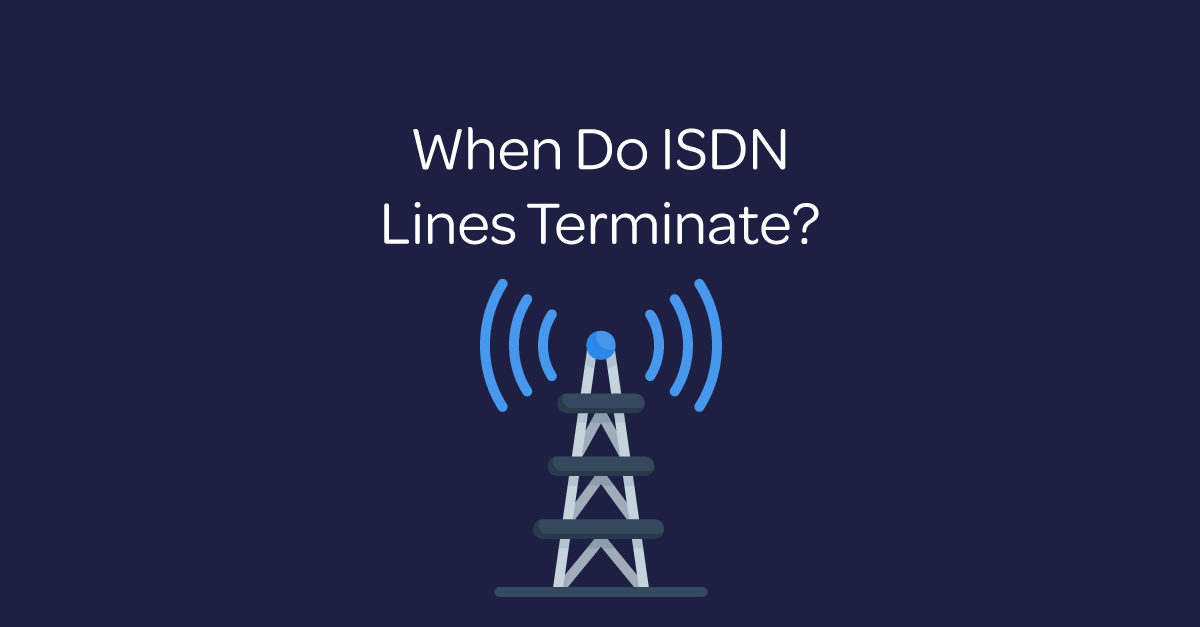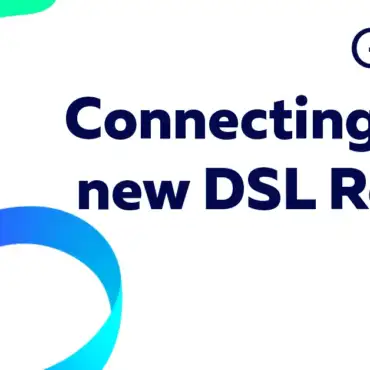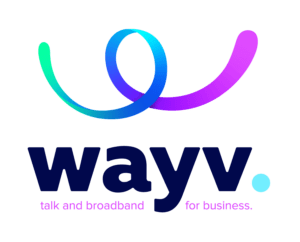Big changes are happening in the world of business communications – and you need to be prepared for them.
Openreach are the controllers of ISDN lines, which many families and businesses are reliant on to make phone calls.
However, they’ve now decided to shut these lines down and replace them with a more modern alternative…
What is this alternative? VoIP phone systems.
So, if you want to learn more about how your business needs to adapt, make sure to keep reading. Don’t worry, this blog is fun and simple. By the end of it, you’ll be an expert on why ISDN lines are being terminated and the steps you need to take.
Plus, we won’t use any complicated jargon.
What is ISDN?
Firstly, let’s do a quick rundown of what ISDN actually means.
ISDN stands for Integrated Service Digital Network.
It might sound a little complicated, but it really isn’t.
ISDN is a circuit-switched telephone network system that’s been around for several decades now. Think about your home landline, or the landline that your grandparents use. The chances are, they both use ISDN connections.
Basically, ISDN lines are part of the old-school phone system where a digital line runs through copper wiring. In its heyday, it was a lot faster than traditional analogue lines.
However, technology is moving forward, and ISDN lines are quickly becoming irrelevant and dated, hence why they’re being permanently shut down by Openreach.
Like most things in life, it’s time to make way for the old and bring in the new!
Want a quick history lesson on ISDN? Let’s go back in time.
ISDN was first introduced in 1988 – over 30 years ago!
In simple terms, ISDN lines were seen as the modern replacement for traditional copper lines that had been around since the late 1800s.
Naturally, it didn’t take long for ISDN lines to explode in popularity. Throughout the 90s, ISDN lines were used by pretty much all major businesses and family homes. England, Japan, India, the United States, and Australia were all major users of ISDN lines.
If you were to jump into a magic time machine and go back to a 90s business park and walk into any of the offices, you would see a bunch of employees speaking on telephones using ISDN lines – ISDN lines were everywhere.
Unsurprisingly, ISDN lines remained popular and relevant through the 2000s. However, during the 2010s, they have slowly started to fade in power due to VoIP phone systems catching on (which had first started to appear in the late 90s to mid-2000s).
Imagine it like this: ISDN lines are like old Nokia brick phones, whereas VoIP phone systems are the iPhone 13.
VoIP systems are:
- Better
- More modern
- Have tons more features
It’s that simple.
VoIP is the future for business communications, but we’ll talk about this a little later.
How Do ISDN Lines Work?
In plain English, ISDN lines are digital phone lines. Back in the old days, they were viewed as revolutionary.
ISDN works by transmitting data and voices over digital lines. When you speak into the phone, your voice gets transmitted down this digital line into the ear of the other person you’re on the phone with.
Because of this, ISDN lines were able to provide faster speeds and higher quality calls than traditional phones.
For example, if you were to use an ancient phone system from the 1800s today, you would hear how crackly and poor-quality they were. However, if you were to use an ISDN line, you would see the positive difference.
But, because ISDN lines have been around for over 30 years, their time in the spotlight is naturally coming to an end.
Don’t worry, though, the switch off is nothing to be afraid of – but it is going to cause disruption to your business if you aren’t prepared for it.
What is the ISDN Switch Off?
So, now that we’ve completed a brief history lesson on ISDN, let’s get into the big topic: the ISDN switch off.
Copper lines, which have been around since 1876, are being wiped out. Why? Because they’re too costly to maintain. It’s a bit like trying to maintain an old, beaten-up car – it’s simply not worth the time or effort anymore!
So, back in 2015/2016, BT made the crazy announcement that individuals and business will no longer be able to purchase ISDN lines. However, they then backed down from this decision; changing it so that you can now purchase ISDN lines up until 2023. Then, between April and December 2025, there will be a forced migration stage to VoIP phone systems.
Essentially, ISDN lines are on a life-support machine, meaning there’s absolutely no point buying them at this stage in time.
If you were to purchase an ISDN system right now for your business, it would be a bit like buying a car that’s going to be banned from roads in a couple of years. In other words, you’d be wasting a big bag of money.
What Should I Do if My Business Uses an ISDN line?
If your business is currently tied into a contract with an ISDN phone system, don’t panic.
“My business uses an ISDN phone system – what do I do?!”
Many business owners find themselves in sticky situations like this.
However, we at wayv. have saved hundreds of these businesses by getting them out of awful contracts and switching them to VoIP phone systems, instead.
ISDN lines are still going to be active until 2025, meaning you’ve got around 3–4 years to make the switch. Considering you can ditch your ISDN system and be set up with a VoIP system within a matter of weeks, there’s plenty of reason to be excited (and not worried).
When making the switch, you need to switch to VoIP. For decades to come, VoIP phone systems are going to be the new business standard, as they are so much better than ISDN phone systems.
VoIP systems use the internet to make and receive phone calls, enabling faster communications and more features. To learn more, here are the advantages of VoIP phone systems.
In summary, some of the best features of VoIP systems are:
- Video conferencing
- Call forwarding and transferring
- Automatic voice attendants (those friendly little robot voices that guide you when you call a company number)
- Call recording
- Customizable hold music
Also, if you know that your future business model is going to revolve around working from home, you will one hundred percent need a VoIP phone system. Otherwise, your phone agents (and other staff) will not be able to communicate with your customers and clients from home. So, whether your employees work in a busy office or from their homes, a VoIP system is essential for success.
There is a slight catch, though: your business needs a strong internet/broadband connection for your VoIP system to work. But don’t worry: a lot of VoIP phone system providers (like us) can provide 2-for-1 deals by including broadband with your system. Talk about convenience!
Also, when using a VoIP phone system, you will no longer have to be reliant on ugly (and clunky) old phones. Instead, you and your team will be able to make and receive calls through your computers, laptops, and smartphones. This way, you can operate like a true modern business.
Remember, it seems highly likely that the future of business is working from home.
Nowadays, thousands of businesses around the world are sending their employees home to work their permanently – and one of the main reasons they are able to do this is because of VoIP phone systems.
So, if you know for certain that you want to give your employees the option to work from home, you will need to get a VoIP contract – make no doubt about it!
The Next Steps You Need to Take
Let’s go through the steps you need to take moving forward.
1. Contact a reliable VoIP phone system provider. Wayvare phone experts who can help your business make the switch to VoIP in a matter of weeks.
2. Have one of our engineers come out to install your phone system. Whether you’re a busy marketing agency or a small solicitor’s firm, our engineers can come out to see you and have everything installed within a couple of days.
3. Go through a brief training session on how you and your team can use your new VoIP system. Because VoIP systems have more features and run through the internet, you will need a little training to understand the ins and outs. Don’t worry, though, nothing is complicated.
4. Experience amazing communications for years to come. Due to the amazing features that VoIP systems provide, you and your employees will be able to communicate with your customers and clients to a much higher standard.
Plus, you don’t have to worry about splashing too much money, as Wayv’s phone systems are incredibly affordable. In fact, we can actually save you money compared to your current provider, so don’t hesitate to get in touch today.
No matter how many employees you have, our individual user costs will appeal to your budget.
Our Knowledge Hub For SME Insights
Wayv Shortlisted in Chamber of Commerce Awards 2025
We're pleased to share that we've been shortlisted by the Barnsley & Rotherham Chamber of Commerce in their annual awards for the second year running!
Wayv Volunteering July 2025
On Friday 11th July, the Wayv team helped out at Norton Nurseries, a food growing site recently acquired by Food Works, a Sheffield-based social enterprise.
Guide: Connecting your new DSL Router
Instructions for connecting your new DSL router
Navigating the Big Switch Off for your business
If you’re one of the estimated 75% of small to medium businesses still relying on traditional phone lines, read on to find out how to navigate the switchover.
Why business phone systems are adding more value than ever
Phone systems now integrate with other business systems as standard, enabling a more streamlined approach to managing business communications.
Wayv Shortlisted in unLTD Business Awards 2024
Following on from our shortlisting in the Barnsley and Rotherham Chamber of Commerce’s Celebration of Business Awards, we’re…
Wayv Shortlisted in Chamber of Commerce Awards 2024
“We’re proud to be shortlisted in these awards alongside some fantastic local businesses. Our continued growth is testament…
Wayv Certified Carbon Neutral for Second Year
Wayv are delighted to have been certified carbon neutral by Carbon Neutral Britain for the second year running.














